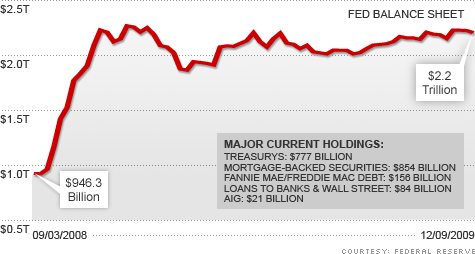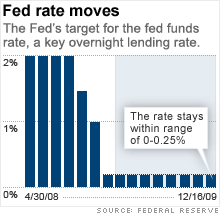Search News

NEW YORK (CNNMoney.com) -- The Federal Reserve kept its key interest rate near 0% and appeared ready to do so for the foreseeable future, after declaring Wednesday that despite signs of improvement, the nation's economy is likely to remain weak.
The fed funds rate is used as a benchmark to determine interest paid by consumers on credit cards and home equity loans, as well as the rate paid on many business loans.

Fed policymakers cut the rate to a range between 0% and 0.25% in December 2008 in an effort to keep the economy from falling into a depression. It left it at that level throughout all eight 2009 meetings, even amid signs that the worst recession since the Great Depression came to an end at some point during the year.
The Fed's statement that accompanied that decision cited a number of areas of the economy that are getting stronger, including the housing market and consumer spending. It said the labor market and business investment continue to lose ground, although at a slower pace. (Read the statement)
This is the first Fed statement since the Labor Department reported a sharp drop in the number of net jobs lost by the economy to 11,000 in November, the smallest monthly decline by far since the start of 2008. It also follows better-than-expected numbers on such economic readings as retail sales and industrial production.
"I would say they're more bullish than previous Fed statements, but only because the latest data readings have been more bullish," said Keith Hembre, chief economist for First American Funds.
U.S. stocks, which had been higher, slipped and were mixed after the Fed's statement, while the dollar rallied against the euro in currency trading.
Bob Brusca of FAO Economics said he believes the Fed statement was cautious partly because of the effect it can have on expectations in the bond market. If investors thought the Fed was getting ready to raise rates, they would drive up the rates paid on Treasurys and that could slow economic activity by itself. Bond prices and yields were little changed following the statement's release.
"I think the Fed's job is to be pessimistic," said Brusca. "If the Fed starts talking about strong growth, it's going to scare the bond market and drive up rates."
Hembre believes the Fed policymakers still see enough genuine risk for the recovery that they will wait as long as possible, most likely until 2011, before starting to raise rates.
The Fed's statement seemed to confirm that view, saying the continued weakness and the low risk of inflation meant that it is likely to "warrant exceptionally low levels of the federal funds rate for an extended period."
The low rates are only part of what the Fed has done to try to pump up the struggling U.S. economy since a crisis hit global financial markets in September 2008. It has added hundreds of billions to the economy through an expansion of its balance sheet to more than $2 trillion. To keep credit flowing, it has bought long-term Treasurys, mortgage-backed securities and a number of other types of loans to both financial firms and major corporations.
The Fed said all those programs remain in place, although it confirmed that the situation has improved enough in some of those markets to allow the central bank to let some of them end as planned during the course of 2010.
But it gave no timetable for when it would start to unwind its large position in mortgage securities or long-term Treasurys. It said only that it "will continue to evaluate the timing and overall amounts of its purchases of securities in light of the evolving economic outlook and conditions in financial markets."
"Most likely, there was discussion of an exit strategy at today's meeting, as was the case in November," said Sung Won Sohn, professor at California State University Channel Islands. He said the low inflation expectations give the Fed a chance to hold off on a rate hike as long as possible.
"The timing of the rate hike will also depend on how fragile the psychology in the financial market is," he said. "The last thing the officials want is to precipitate another financial crisis by implementing the exit strategy too soon."
The two-day meeting concluded the same day Time magazine picked Fed Chairman Ben Bernanke as its 2009 "Man of the Year" for his role addressing the nation's economic problems.
It also comes the day before Bernanke faces a vote in the Senate Banking Committee on whether he'll be confirmed to another four-year term to head the central bank. Approval is widely expected, although his nomination has brought some harsh criticism from both ends of the political spectrum in the Senate. ![]()






| Index | Last | Change | % Change |
|---|---|---|---|
| Dow | 32,627.97 | -234.33 | -0.71% |
| Nasdaq | 13,215.24 | 99.07 | 0.76% |
| S&P 500 | 3,913.10 | -2.36 | -0.06% |
| Treasuries | 1.73 | 0.00 | 0.12% |
| Company | Price | Change | % Change |
|---|---|---|---|
| Ford Motor Co | 8.29 | 0.05 | 0.61% |
| Advanced Micro Devic... | 54.59 | 0.70 | 1.30% |
| Cisco Systems Inc | 47.49 | -2.44 | -4.89% |
| General Electric Co | 13.00 | -0.16 | -1.22% |
| Kraft Heinz Co | 27.84 | -2.20 | -7.32% |
|
Bankrupt toy retailer tells bankruptcy court it is looking at possibly reviving the Toys 'R' Us and Babies 'R' Us brands. More |
Land O'Lakes CEO Beth Ford charts her career path, from her first job to becoming the first openly gay CEO at a Fortune 500 company in an interview with CNN's Boss Files. More |
Honda and General Motors are creating a new generation of fully autonomous vehicles. More |
In 1998, Ntsiki Biyela won a scholarship to study wine making. Now she's about to launch her own brand. More |
Whether you hedge inflation or look for a return that outpaces inflation, here's how to prepare. More |